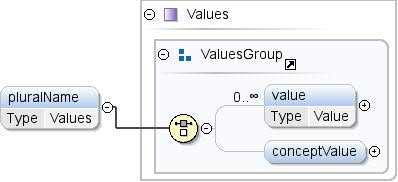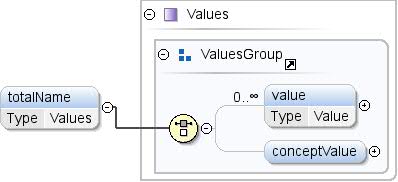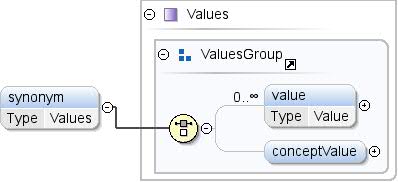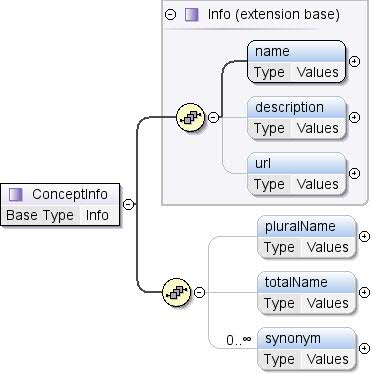Component: ConceptInfo
Stay organized with collections
Save and categorize content based on your preferences.
outlined_flag
ConceptInfo provides textual information about a concept, extending the base Info type with concept-specific fields.
It includes fields like pluralName (e.g., "States" for "State"), totalName (e.g., "All US" for "State"), and synonyms for the concept.
These fields help in referencing and understanding the concept within the dataset.
ConceptInfo is used within the "Concept/info" element and is an extension of the "Info" type.
Namespace
http://schemas.google.com/dspl/2010
Annotations
A name used to refer to a collection of instances of the
concept (e.g., pluralName of "State" is
"States").
Diagram
Type
Values
Properties
content:
complex
minOccurs:
0
Model
value* | conceptValue{0,1}
Children
conceptValue , value
Instance
<pluralName>
<value lang="">{0,unbounded}</value>
<conceptValue concept="">{0,1}</conceptValue>
</pluralName>
Source
<xs : element name = "pluralName" type = "Values" minOccurs = "0" >
<xs : annotation >
<xs : documentation>A name used to refer to a collection of instances of
the concept ( e . g ., pluralName of "State" is "States" ).</ xs : documentation >
</ xs : annotation >
</ xs : element >
Namespace
http://schemas.google.com/dspl/2010
Annotations
A name used to refer to all the instances of the concept (e.g.,
totalName for "State" is "All US").
Diagram
Type
Values
Properties
content:
complex
minOccurs:
0
Model
value* | conceptValue{0,1}
Children
conceptValue , value
Instance
<totalName>
<value lang="">{0,unbounded}</value>
<conceptValue concept="">{0,1}</conceptValue>
</totalName>
Source
<xs : element name = "totalName" type = "Values" minOccurs = "0" >
<xs : annotation >
<xs : documentation>A name used to refer to all the instances of the
concept ( e . g ., totalName for "State" is "All US" ).</ xs : documentation >
</ xs : annotation >
</ xs : element >
Namespace
http://schemas.google.com/dspl/2010
Annotations
A synonym that can be used to refer to this
concept.
Diagram
Type
Values
Properties
content:
complex
minOccurs:
0
maxOccurs:
unbounded
Model
value* | conceptValue{0,1}
Children
conceptValue , value
Instance
<synonym>
<value lang="">{0,unbounded}</value>
<conceptValue concept="">{0,1}</conceptValue>
</synonym>
Source
<xs : element name = "synonym" type = "Values" minOccurs = "0" maxOccurs = "unbounded" >
<xs : annotation >
<xs : documentation>A synonym that can be used to refer to this concept .</ xs : documentation >
</ xs : annotation >
</ xs : element >
Complex Type: ConceptInfo
Namespace
http://schemas.google.com/dspl/2010
Annotations
Textual information about a concept in the dataset. This
extension of the base Info type adds a few additional fields that only
apply to concepts.
Diagram
Type
extension of Info
Type hierarchy
Used by
Model
name , description{0,1} , url{0,1} , pluralName{0,1} , totalName{0,1} , synonym*
Children
description , name , pluralName ,
synonym , totalName , url
Source
<xs : complexType name = "ConceptInfo" >
<xs : annotation >
<xs : documentation>Textual information about a concept in the dataset . This extension of
the base Info type adds a few additional fields that only apply to
concepts .</ xs : documentation >
</ xs : annotation >
<xs : complexContent >
<xs : extension base = "Info" >
<xs : sequence >
<xs : element name = "pluralName" type = "Values" minOccurs = "0" >
<xs : annotation >
<xs : documentation>A name used to refer to a collection of instances of
the concept ( e . g ., pluralName of "State" is "States" ).</ xs : documentation >
</ xs : annotation >
</ xs : element >
<xs : element name = "totalName" type = "Values" minOccurs = "0" >
<xs : annotation >
<xs : documentation>A name used to refer to all the instances of the
concept ( e . g ., totalName for "State" is "All US" ).</ xs : documentation >
</ xs : annotation >
</ xs : element >
<xs : element name = "synonym" type = "Values" minOccurs = "0" maxOccurs = "unbounded" >
<xs : annotation >
<xs : documentation>A synonym that can be used to refer to this concept .</ xs : documentation >
</ xs : annotation >
</ xs : element >
</ xs : sequence >
</ xs : extension >
</ xs : complexContent >
</ xs : complexType >
Created using the
oXygen XML Editor .
Except as otherwise noted, the content of this page is licensed under the Creative Commons Attribution 4.0 License , and code samples are licensed under the Apache 2.0 License . For details, see the Google Developers Site Policies . Java is a registered trademark of Oracle and/or its affiliates.
Last updated 2024-06-26 UTC.
[null,null,["Last updated 2024-06-26 UTC."],[],["The core content describes the \"ConceptInfo\" element, which extends the base \"Info\" type and provides textual information about a concept. Key actions involve defining names for collections of concept instances using `pluralName` (e.g., \"States\"), referring to all instances with `totalName` (e.g., \"All US\"), and specifying `synonym` for alternative concept names. `pluralName`, `totalName`, and `synonym` use complex `value` or `conceptValue`. ConceptInfo also contains `name`, `description` and `url`.\n"]]



